
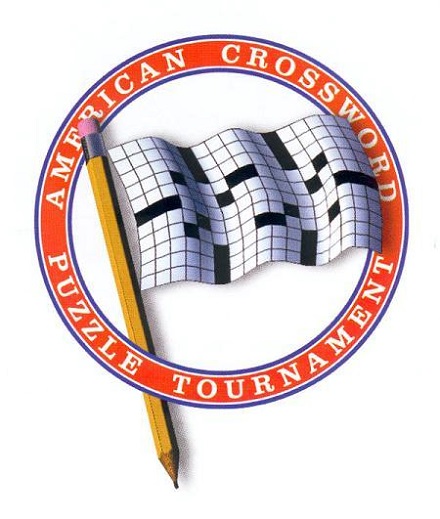
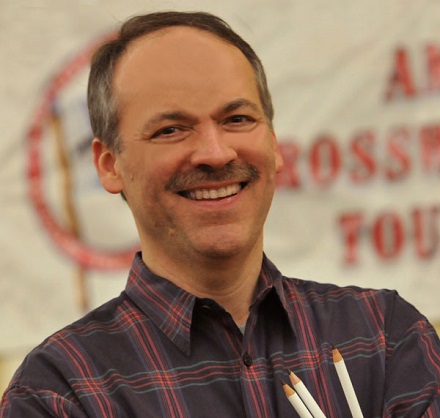
Sports Destination Management: While crossword puzzles would certainly be included in the category of mind sports, the American Crossword Puzzle Tournament is an independent event and is not associated with other competitions. How long has it been around?
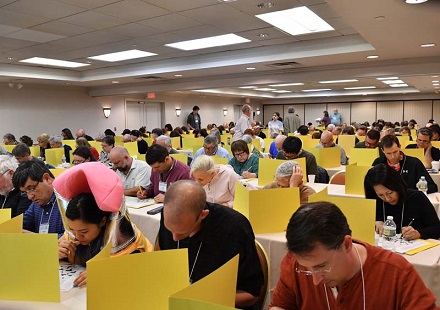 Will Shortz: In March we will host our 42nd annual tournament. I founded the event in 1978 when I was 25 years old.
Will Shortz: In March we will host our 42nd annual tournament. I founded the event in 1978 when I was 25 years old.
SDM: Are there others?
Shortz: There are some newer ones — one-day events in New York, Los Angeles, and Washington, D.C., which have become popular. There are also small crossword competitions held at libraries around the country.
SDM: What is the attendance for your tournament?
Shortz: Last year we had 674 competitors. Total attendance was around 1,000.
SDM: Is there a profile of the average competitor, such as age or gender?
Shortz: It’s actually quite a broad range. The competitors vary from mid-teens up to their 90s. There's about a even split between men and women. The occupations range widely, too. The most common professions are musicians, teachers, lawyers, financiers, and computer programmers, but last year we also had one each of hip-hop impresario, golf course ranger, pastry chef, and supermarket stock clerk. Last year 38 states and five Canadian provinces were represented.
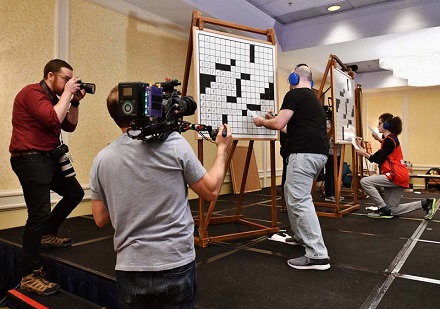 SDM: Is that kind of variety surprising?
SDM: Is that kind of variety surprising?
Shortz: Not really. More than 50 million Americans say they solve crosswords at least occasionally. The New York Times crossword, which I edit, is solved regularly by several million.
SDM: What about the venue you are using for the tournament?
Shortz: The venue is the Stamford Marriott Hotel, where the event was founded in 1978, and where it's been for almost all its 42 years. That first year we had 149 competitors. Last year, as I said, we had 674. That's too many to seat in the hotel's main ballroom. To accommodate everyone, there's spillover into a second, smaller ballroom downstairs. The hotel provides livestreaming from the upstairs ballroom to the contestants downstairs to keep them connected. Still it's not ideal.
SDM: That’s quite a bit of growth.
Shortz: True. Another issue is that we now sell out all the hotel's guestrooms a week or two before the event, which I fear dampens attendance. Last-minute registrants have to go to other hotels in the area.
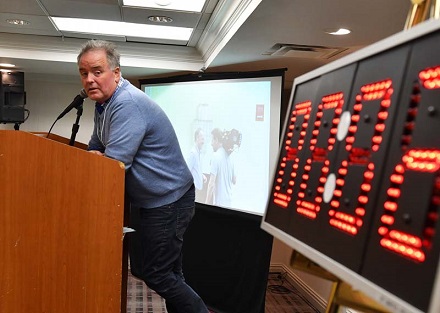 SDM: Ideally, would you like to move somewhere else?
SDM: Ideally, would you like to move somewhere else?
Shortz: It's something I'd consider.
SDM: What kind of venue would you prefer?
Shortz: I’d like to stay in the New York area, because that’s where I live, and that’s where the bulk of our officials come from. Also, because New York is a cultural capital, probably more crossword solvers live here than anywhere else.
SDM: What are the physical needs of the tournament?
Shortz: We need a large ballroom. The Stamford Marriott's ballroom has about 10,000 square feet, so bigger would be better. Also, the hotel should be affordable. The Stamford Marriott offers a group room rate of $129/night, which is very reasonable. And it should have a convenient location. The Stamford Marriott is located at an interstate exit and just a few blocks from a train station on MetroNorth. I realize it's impossible to duplicate all these conditions elsewhere.
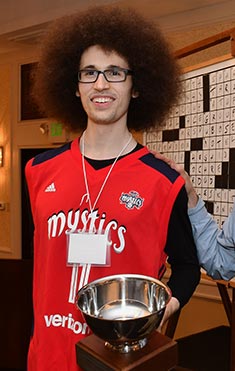 Editor’s note: If destinations and/or venues are interested in hosting the American Crossword Puzzle Tournament and would like to discuss the possibility, they are encouraged to use this link.
Editor’s note: If destinations and/or venues are interested in hosting the American Crossword Puzzle Tournament and would like to discuss the possibility, they are encouraged to use this link.
SDM: How is the tournament set up?
Shortz: The event starts with warm-up puzzles and games and a wine and cheese reception on Friday night. The competition takes place Saturday morning, Saturday afternoon and Sunday morning. Contestants score points for accuracy and speed. At noon on Sunday, the top-scoring contestants come to the ballroom stage to solve a final puzzle on giant grids, standing at large boards while everyone watches. The event is announced live as at a sporting match. The contestants wear headphones so they can't hear. It's an amazing, exciting finale.
Editor’s note: See schedule and list of prize categories here
SDM: Are the puzzles electronic or paper?
Shortz: Everything is done on paper. Solving on paper puts everyone on an equal basis.
SDM: How long do people take to go through a puzzle?
Shortz: Top contestants can do an easy puzzle in two to three minutes.
SDM: It goes without saying nobody is using their smartphones to look up answers for the puzzles at any time.
Shortz: Ha! Not at this tournament. Anyway, looking things up would probably just slow the contestants down.
SDM: Do you have sponsorship for the tournament?
Shortz: Right now the prize money comes entirely from the entry fees. The first prize is $5,000. More than $10,000 is awarded altogether. It’s funny, though — most people don’t come for the prizes. They come to test themselves, to meet kindred spirits, and to solve some first-rate puzzles. You’ll hear them talking at the reception or at lunch, and they talk about everything in life. They’re interesting people with lively minds. They’re smart and funny and have a wide range of interests.
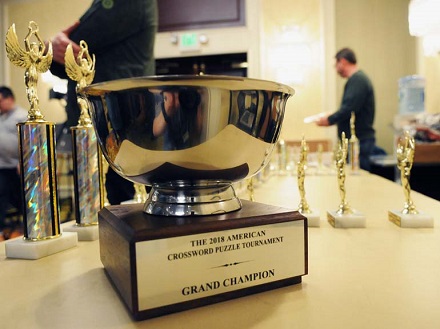 SDM: Do they have anything in common?
SDM: Do they have anything in common?
Shortz: Crossword puzzlers have wide vocabularies, of course, and they're good spellers. They know a little about everything – not just classical subjects, but also TV, movies, popular music, sports, politics. I think it’s because virtually everything in life can appear in a crossword.
SDM: Do you ever get people from other countries?
Shortz: We get a fair number from Canada, plus a sprinkling from other countries. American crosswords are so American-centric, though — and, of course, they're in English — that most foreigners can't solve our puzzles easily.
SDM: Does the event sell out?
Shortz: So far we've never turned anyone away, but we're really pushing the limits of the hotel. This year's registration is now open, and it continues up to the day of the event.
SDM: Do you think technology – the ability to look something up on a phone, the ability to do crosswords online – has hurt or threatened the position of crosswords?
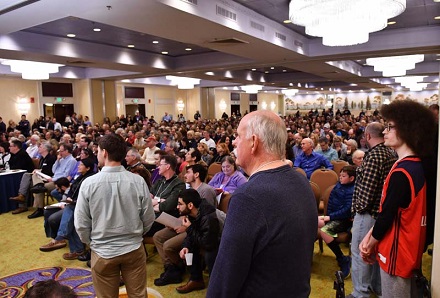 Shortz: Crosswords started on paper. When digital media first appeared I was a little concerned. But I’ve come to see that they work digitally as well. Almost half a million people now subscribe to the New York Times crossword online. Crosswords tap every field of human knowledge. That’s part of their appeal. Also, crosswords are problems we can solve. In our everyday lives we're confronted with all sorts of issues, and we muddle through as best we can. With a crossword, if you follow the process from start to finish, you can achieve perfection. That's a great feeling, something you don't often get in life. And there’s a certain satisfaction in being able to fill those empty spaces.
Shortz: Crosswords started on paper. When digital media first appeared I was a little concerned. But I’ve come to see that they work digitally as well. Almost half a million people now subscribe to the New York Times crossword online. Crosswords tap every field of human knowledge. That’s part of their appeal. Also, crosswords are problems we can solve. In our everyday lives we're confronted with all sorts of issues, and we muddle through as best we can. With a crossword, if you follow the process from start to finish, you can achieve perfection. That's a great feeling, something you don't often get in life. And there’s a certain satisfaction in being able to fill those empty spaces.

